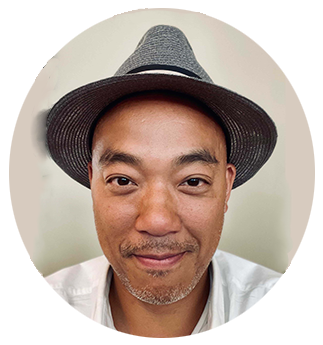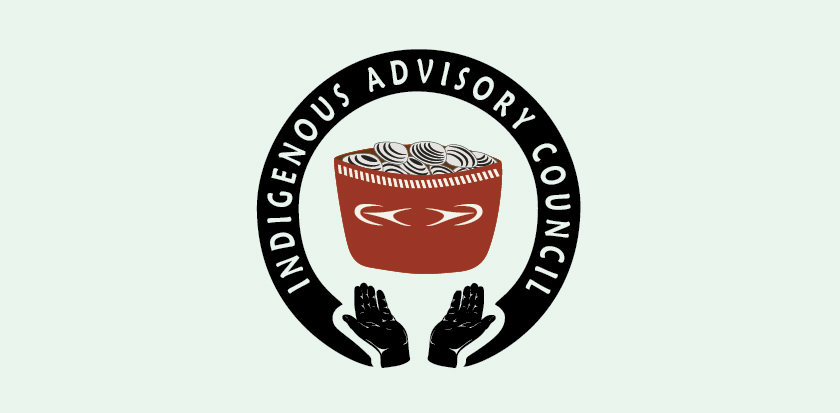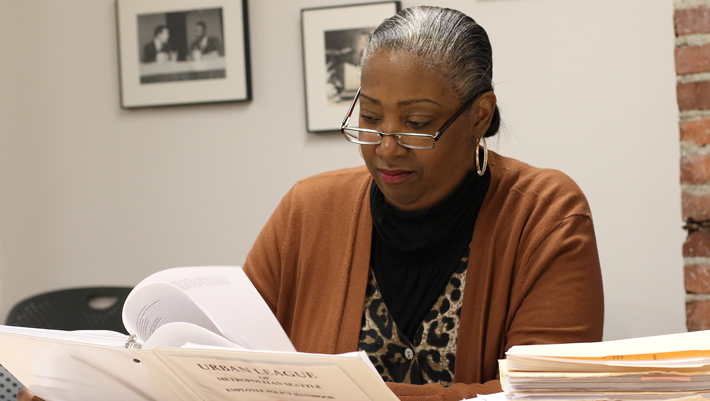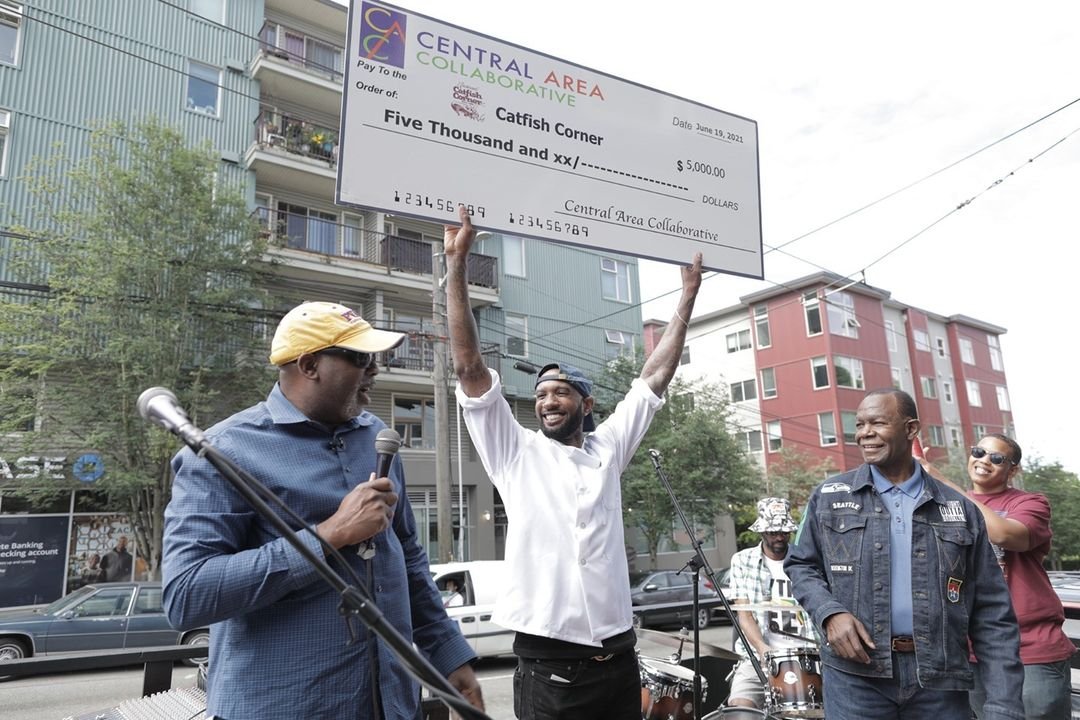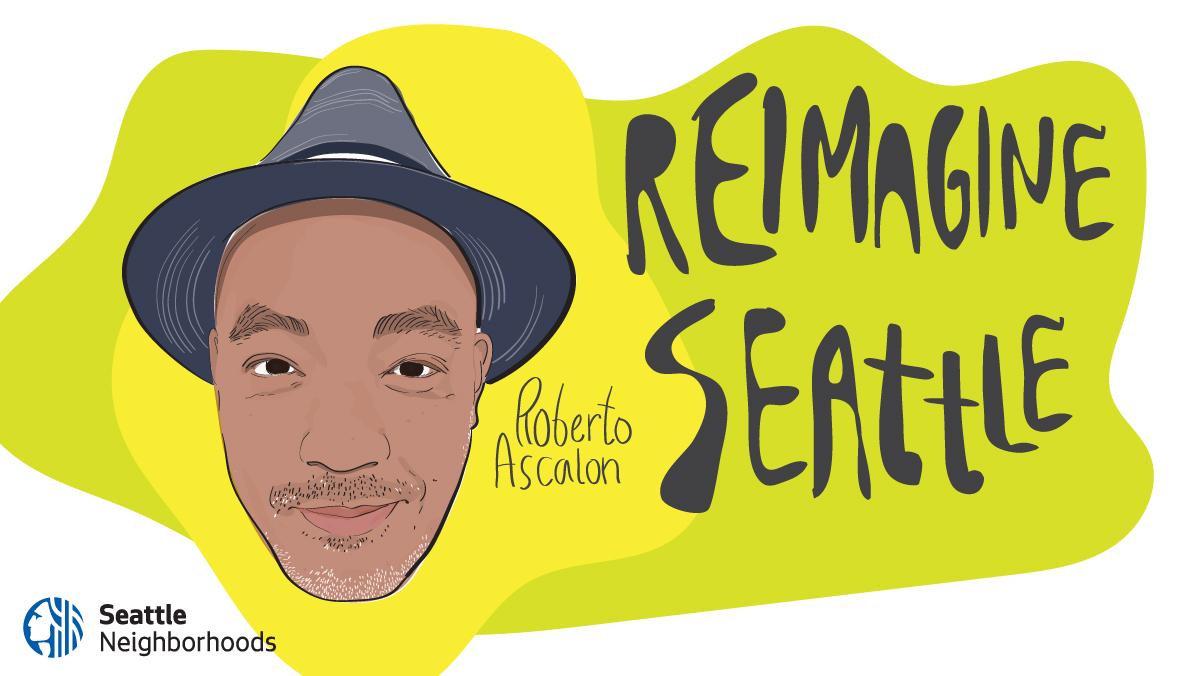
The challenges of the past two years have changed the way we live, the way we work, and the way we show up for each other. They have also given us a rare chance to collectively reimagine our future. Through the Reimagine Seattle Storytelling Project we invite community members to reflect on their current experiences in Seattle, how they have been impacted by recent events, and their hopes for the future of our city.
My Fearless Imagination or How Re-imagining Seattle is a Question Better Asked of Fire
by Roberto Ascalon
again, a question of fire
Reading books to my son before bedtime taught me to cry well. For the first few years of my son’s life, I cried a lot. I mean really cried.
Those first few years I learned to cry without using all the muscles of my face. I’d get all pink-faced over his bedtime story and silently, silently, ever so silently take a single deep head-nodding sobs in between words. I felt like this big ass bald-headed Quasimoto hunching beside his crib hissing, “don’t look at me!” And it’s not because I don’t want him to see me cry. Quite the contrary – I’m gonna teach that boy to cry if it’s the last thing I do! Muhahahaha! No. That’s just a joke. It’s because watching your dad work out existential issues can be trying, and I believe in trying to reduce the amount of PTSD I dole out just before bedtime as much as I can.
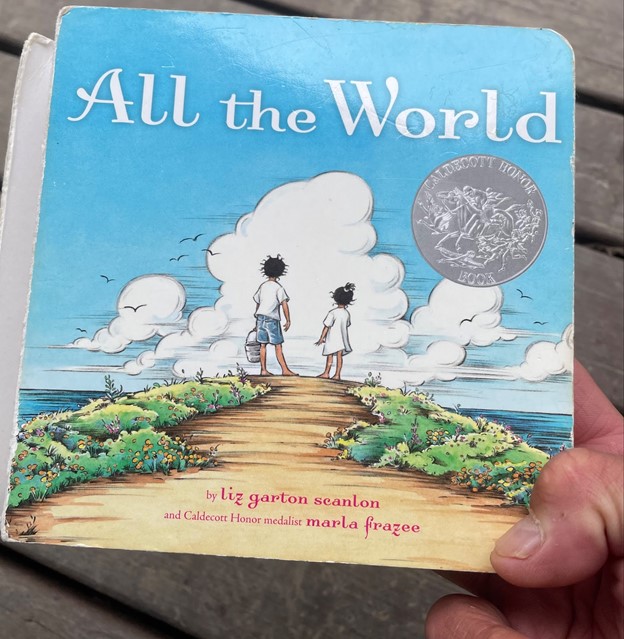
One of my favorite crying books thus far is All The World, by Liz Scanlon & Marla Frazee. The story is ostensibly about a day in which a girl collects a shell then looks at it before bed – a day in the life of a sweet little family and their community by the sea – but it manages to accomplish this magical thing that sometimes children’s books do, it implies the biggest of things. It’s about cycles of nature, beginnings, childhood, joy, aging, loss, community, celebration, joy, endings, circles, death even, but it speaks through these little hand-drawn vignettes: waves against an ocean, a family going to plant a tree, a feather floating through a darkening windy sky, a moment of repose on a sunset pier, a party with multiple generations playing music around a fireplace, then, bedtime, at last. The end takes us back to the beginning. It’s just as simple and beautiful as that.
When I get to the lines “All the world is you and me / Everything you hear smell see / Hope and Peace and Love and Trust. / All the world is all of us,” I tend to dig my fingers into the comforter and twist – in a vain effort to keep my heart from twisting out of my chest. This line says everything I want to offer, – not just to my son but to everyone and all things. But the all of it all, sometimes it’s just too much to take. It makes my head and heart spin, so my fingers dig in, as if somehow that will stop the world from spinning. Stop time from moving. Stop it all from happening happening happening…
To realize the immensity of it all – it’s enough to make you cry.
It’s just that I don’t think I could have imagined how helpless I sometimes feel as a parent. There’s an old Sweet Honey In The Rock song that quotes Gilbran, “Your children are not your children. They are the sons and daughters of life’s longing for itself.” Part of my task in parenthood, especially in the face of the pandemic, has been to accept this squalling armful, knowing full well that if he is to become himself, he must slip away one day from me. To be in the presence of your own child, especially over the last few years, is to be forced to realize your smallness in the measure of things. If I’ve been a good papa, done what I can to help him to be the person he chooses to become, the very best I can hope for is for him to want to hold my hand as I go. I should hope that someone beloved to him offers him that same grace and comfort. In this way, upon my son’s birth, I became assured of a kind of impending beautiful & terrible solidarity: one day we both must die.
It’s so strange to recognize the sublime joy of the singularity of existence and the horror of the inevitable simultaneously. It’s precisely this recognition that begs me to revel in the cutting, absurd, fleeting, vulnerable sweetness of time as it passes. When you are beholden to a child you become just another doorway to the forever flood of the universe as it makes its way through our tiny little bodies. You cease to be yourself because part of you is forever somewhere else, a place, as Gilbran says, that you can never go, not even in your dreams. Maybe that’s why another line from the book touches me so deeply: All the world is everything. Everything is you and me. Whether you realize it or not, once you have a child, you become part of something bigger.
I did not watch the video of George Floyd’s murder. I got so far as an online article bearing a frozen video still; a grainy close-up of a knee on his neck. As I clicked, the footage rolled and my breath stopped the moment I heard the thickening sound in his voice. Intuitively and immediately I clicked away. There’s a kind of solidarity that allows us to live with integrity and another kind that turns us into martyrs. I knew something in me might just snuff out had I watched much further.
But my mother watched it. The whole thing. We were 2,745 miles apart on a video call when she told us about the rest. The scene was all there, translated through the sound of my mother’s voice as she keened and moaned and begged, “But how could they? How could they do a thing like that? He was calling for his mama.” I could feel she wanted to cup her own hand to my face as she cried and talked. Like my son does to his mother sometimes before he goes to bed.
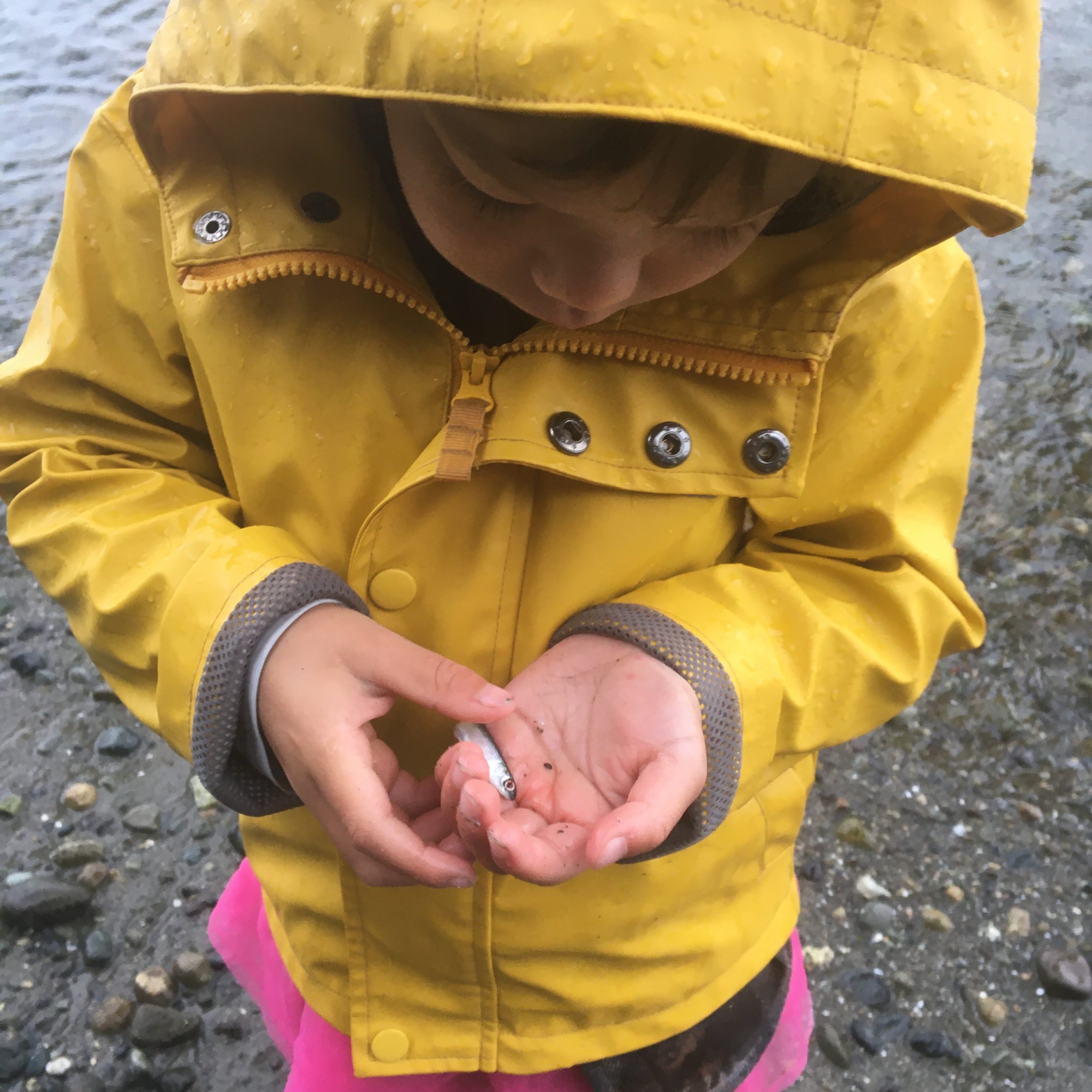
It was just the three of us for my birthday on May 30, 2020. Hashtag pandemic birthday. The uprising in Minneapolis had already begun. I wanted to spend the day just walking along the beach at low tide in the shadow of the pylons of the Tacoma Narrows Bridge. So, we went. We took pictures. My son found a baby fish laying out on the rocks. It was beautiful. A herring. A candlefish, perhaps. He cradled it in his hand the rest of the walk, all the while gently marveling at the black and blueness of its back. It was a lovely time. Perfect in its own right.
As we drove home, I began getting a flood of texts all at once. Turns out, my wife had asked a few of my beloved friends to find poems and read them, then send them to me over video. I often get floored in moments like that. Had I been alone I probably wouldn’t have summoned the courage to brave all that love and listen to them at all. Those beautiful and serendipitously curated poems might have spent the rest of their lives marked as unread texts. But we were in the car driving home after a long and lovely day, which somehow gave me the courage to confront all that beauty. And god was it beautiful. I cried. Shocking, I know.
Some of those texts were mixed in with an announcement from the city. On our way home Mayor Durkin called a city-wide curfew, “in order to protect the health and safety of citizens”. That night the streets exploded. But I did not join the nighttime protests.
That night the streets were for the young. Instead, I wrote a poem. Just one. It’s called “again, a question of fire”.
Some of you may be asking what does that poem have to do with “re-imagining Seattle”? Maybe nothing. Maybe everything.
Sometimes I have the feeling of my resistance waning: it’s pandemic fatigue, compassion fatigue, the brute ugliness of Trump and the violence of his lies, the specter of the radical right, the binarization of politics, the binarization of bodies. It’s tone-deafness, the Supreme Court, and “cancel culture”. It’s driving past 12th and Jackson every day and having to explain to my son. It’s 117-degree weather and a nonchalant acceptance of “Smoke Season”. It’s the labeled addictiveness of vaping and unlabeled addictiveness of Tik Tok. It’s plastic takeout boxes. It’s the death of the bees, death of the orcas, and death of the salmon. It’s the death of rap. It’s driving past 12th and Jackson, seeing one of my former mentees and having to explain who he was to my son. It’s that the cat is getting old. It’s what happened to Rahwa. It’s what happened to Tita Kristen. It’s having to explain it all.
It’s that something has got to give. This city can’t go on like this forever. Neither can this iteration of our world. Or, maybe it’s just me that can’t go on like this forever.
My survival instinct kicks in in these moments – I’m lucky that I can still hear the thing inside me ask me to turn into something else – to become something bigger than myself. It is in these moments that I play make-believe: I am the great Roberto Benigni and Seattle is nothing more than a hollow sound stage for the 2024 re-make of Life Is Beautiful, screenplay ghostwritten by Octavia Butler, the camp guards played by weekend insurrectionists dressed in Hawaiian shirts, AR15s and cheap foam MAGA hats. I wince as I imagine how easily that might come to pass. And I smile because, at least, my imagination has beaten the bastards to the movie rights.
Maybe the fire we need is more of an everyday fire inside ourselves. The fire of ganas. Or maybe it is gospel choir fire, “let our little lights shine shine shine”.Or, maybe, I’m suggesting Seattle needs another “Great Fire” where we can warm our palms while the shit burns down and we put our organizational equity statements to the test as we live out the precise distinction between equity & equality in real-time as we scramble to hit reset in the rubble. Maybe we ought to remember what Jimmy said, “no more water, the fire next time”.
I don’t know. Maybe this poem is the only thing I’ve written since I went to grad school for my stupid creative writing degree and I’m looking for proof that I’m a real writer, looking for proof that all my time was worthy, that my voice meant something to someone here, that I have something to return to once my son doesn’t need me so much. In another time, I would have stilled these fears by reading out loud to a bunch of strangers at some poetry reading on Capitol Hill where my smallness might float away on a drunk cloud of mutually pleasuring applause, in some late-night cafe staffed by aging hippies, or in the haze of a bar-playground-laundromat festooned by hipsters from the early aughts. But, like cigarettes after the ban, I realize all those places I’ve just described have gone up in gentrification smoke. I might as well have imagined them.
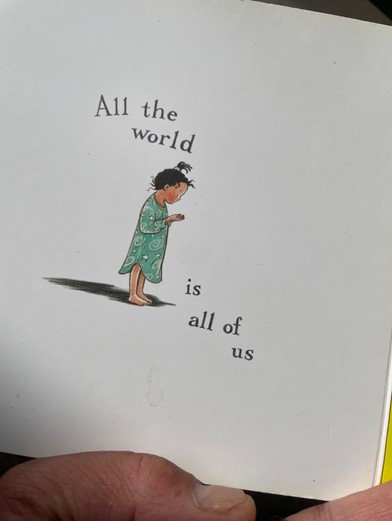
But I guess I do know a few things. I know this poem felt good to write. It felt like I captured some small moment of life in the cup of my hand – it’s my world but also yours. To show you its’ beautiful blue back beauty. To offer some bit of proof. Just to say that “Yes, yes it happened. It all happened, like that… just like you said.” I wanted to see if you liked it. It is as much proof of beauty I can stand to hold at one time. I just wanted to un-cup it and show you. To share. For you to see.
Perhaps, you share the feeling that it’s all too muchy: too beautiful, too hard, too fragile, too lovely, too trying. Because I feel so small and I know I can’t hold it all. Which begs the question: who am I to enthrall a memory, shackle it to my paltry narrative, pin this place and time with my knee, and call it out by a name of my own choosing, force a frame onto the vastness of what by all rights ought to be the unknowable fullness of all our imaginations?
But by god, that’s it, isn’t it? Whenever I stop to write, I’m filled with so much fire.
Somehow writing is a way I manage to stop the world from spinning, stop time from moving, stop it all from happening happening happening. And just like when I stop to be with my son – to really be with him – that’s when I feel it all. And perhaps that’s another way of answering my son when he asked “yes papa, but what is fire?”. Perhaps fire is the feeling of the allness of our imaginations distilled into shape and color and energy for just the briefest of moments as it burns…
I’m afraid of what that kind of fire feels like in my hands. I’m afraid of how good it feels. Of what I might do with it.
That kind of fire burns hot enough to warrant my discretion.
